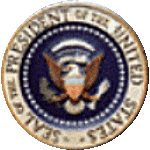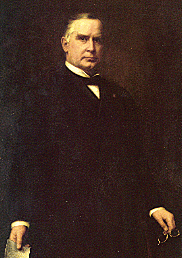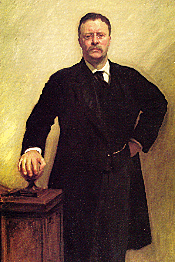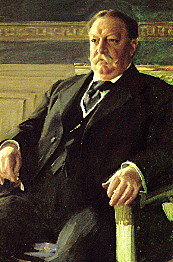Presidents 25-27


William McKinley

In 1898, William McKinley felt he had no choice but to declare war on Spain.
He was most reluctant to do so, however. McKinley had fought in the Union army
in the Civil War and had seen the horrors of battle. "I do not want to
see another," he said.
McKinley had joined the 23rd Ohio Volunteer Infantry (serving under Rutherford
Hayes) two months after the beginning of the war. He won a steady series of
promotions. After the war, he became a lawyer, and in 1876 was elected to
Congress. He served in Congress for 14 years, followed by two terms as
governor of Ohio.
McKinley easily won the Republican presidential nomination in 1896. His
opponent in the election was Democrat William Jennings Bryan, a handsome young
lawyer and passionate public speaker who was very popular with farmers and
working people. However, McKinley had the support of most of the
industrialists and bankers, and the Republicans were able to outspend the
Democrats by a ratio of more than 20 to 1 in the campaign. McKinley won by a
large margin.
When McKinley took office, Cuba was in revolt against Spain. William Randolph
Hearst and other "yellow" journalists did their best to stir up war
fever by printing atrocity stories that portrayed the Spanish as brutal
oppressors. But McKinley tried to avoid war.
On February 15, 1898 the American battleship U.S.S. Maine blew up in Havana
harbor. More than 260 Americans were killed. Although the cause of the
explosion was never determined, many people blamed the Spanish. The pressure
on the President to ask for a declaration of war became intense. McKinley felt
he had no choice, and on April 25 Congress declared war on Spain.
The American army and navy defeated the Spanish forces in four months. In the
peace settlement, Spain agreed to give Cuba its freedom, and ceded Puerto Rico
and Guam to the United States. The fate of the Philippines -- another former
Spanish possession won in the war -- was at first uncertain. Although some
Americans felt that the United States had no business beginning an overseas
empire, President McKinley finally decided that the United States should
"uplift and civilize and Christianize" the former Spanish
possession. He refused to grant the Philippines immediate independence.
McKinley ran for reelection in 1900 and easily defeated William Jennings Bryan
for the second time. But he did not live to enjoy most of his second term. On
September 6, 1901, McKinley was shot by anarchist Leon Czolgosz while shaking
hands at the Pan American Exposition in Buffalo. He died nine days later.

Theodore Roosevelt

Theodore Roosevelt said, "No President has ever enjoyed himself as much
as I." Roosevelt was the most athletic of all the Presidents and probably
the most energetic. He threw himself enthusiastically into everything he did
and urged others to do the same.
Theodore Roosevelt was born on October 27, 1858, in New York City. He was a
sickly child who refused to give in to illness. Roosevelt overcame his
physical problems and grew up to be a barrel-chested athlete who enjoyed
boxing, wrestling, tennis, swimming, rowing, hiking, polo, and hunting. But he
was also an intellectual who graduated with honors from Harvard University,
and a writer who published over 2,000 articles or books. Not since Thomas
Jefferson had there been a President with so many interests.
Roosevelt was elected to the New York State Assembly in 1882. At age 23, he
was the youngest member, but he quickly developed a reputation as a reformer
who was not afraid of a fight.
In 1884, Roosevelt's wife and his mother both died on the same day. Deciding
that hard physical labor was the best medicine for grief, he moved to the
Dakota territory and became a cattle rancher.
But Roosevelt was soon back in New York and back in politics. He served as New
York City's Police Commissioner, battling crime and corruption, for two years.
Then President McKinley made him Assistant Secretary of the Navy, and he
worked hard to enlarge the navy.
When the Spanish-American War broke out, however, Roosevelt knew he had to
fight. He resigned from his position with the navy and joined the 1st United
States Volunteer Cavalry regiment. Roosevelt's "Rough Riders" -- as
the regiment was called -- became famous, and Roosevelt himself returned to
the United States a hero.
After the war, Roosevelt won election as governor of New York. His reform
programs so annoyed the New York Republican bosses that they got Roosevelt
named as President McKinley's running mate in 1900 in order to get him out of
New York. When McKinley was assassinated in September of 1901, Roosevelt, at
age 42, became the youngest man ever to occupy the White House.
Roosevelt was as progressive as he was energetic. He earned a reputation as a
"trust buster" by enforcing the Sherman Antitrust Act. By siding
with striking coal miners against mine owners, he made himself the first
modern pro-labor President.
In 1904, Roosevelt ran for another term in office, promising Americans a
"Square Deal," or fair treatment for all. He easily defeated
Democrat Alton Parker.
President Roosevelt emphasized the role of the United States as a world power
by building the Panama Canal. When Colombia refused to sell the land in Panama
where Roosevelt wanted to build a canal, Roosevelt helped Panama establish its
independence from Colombia. Panama then quickly agreed to the President's
canal plan.
Throughout his life, Roosevelt was concerned with conservation. His
administration reserved more than 125 million acres of woodland as national
forest.
Roosevelt did not seek a third term, but instead named William Howard Taft as
his successor. Taft did win the presidency in 1908, but Roosevelt soon felt
the Taft administration was too conservative. Roosevelt tried to seize the
Republican nomination from Taft in 1912. When he failed, Roosevelt formed his
own Progressive or "Bull Moose" Party. Taft and Roosevelt split the
Republican vote and Democrat Woodrow Wilson became President.
In retirement, Roosevelt went on safari in Africa, explored Brazilian jungles,
and wrote books and magazine articles. During World War I, he offered to raise
and lead a volunteer force, but President Wilson declined the offer. Theodore
Roosevelt died in his sleep at the age of 60 on January 6, 1919.

William H. Taft

William Howard Taft never wanted to be President. His dream was to serve on
the Supreme Court. But a sense of duty kept him in politics far longer than he
wanted.
Taft was born in Cincinnati, Ohio. He was an excellent student and graduated
second in his class at Yale University. Taft went from Yale to law school, and
became a lawyer, a prosecutor, and a judge at an early age. He discovered he
liked being a judge.
In 1900, President McKinley sent Taft to the Philippines to establish a civil
government. Taft was an effective and popular governor. President Theodore
Roosevelt twice offered Taft a position on the Supreme Court, but Taft felt he
owed it to the Filipino people to complete his program, and he turned down
both offers.
In 1904, Roosevelt made Taft his Secretary of War. Roosevelt liked Taft and
trusted him, and eventually decided Taft should be the next President. Taft
did not want to be President, but Roosevelt and Taft's wife Helen persuaded
him to run. In 1908, Taft ran on the Republican ticket and beat Democrat
William Jennings Bryan.
In many ways, President Taft followed in Roosevelt's footsteps. He actually
"busted" more trusts than Roosevelt had. But Taft angered
progressives by supporting a high tariff bill. Roosevelt himself felt betrayed
and tried to wrest the Republican nomination from Taft in the election of
1912. When he failed, Roosevelt ran as the candidate of his own Progressive
Party. Taft and Roosevelt split the Republican vote and democrat Woodrow
Wilson became President.
Taft was happy to leave the White House. He said it was "the lonesomest
place in the world." When his term ended, he returned to the law,
teaching at Yale Law School. In 1921, Taft finally realized his dream:
President Warren Harding appointed him Chief Justice of the Supreme Court. He
did much to make the Court more efficient.
As Taft grew older, he was plagued by various ailments, no doubt made worse by
his excessive weight. (He had a weight problem all his life, frequently
tipping the scales at around 300 pounds.) In February of 1930, he resigned his
position as Chief Justice, and died one month later, on March 8.

All images of Presidents are courtesy of whitehouse.gov
Information taken from Software titled "American Heritage The History of
the United States for Young People.
The copyright belongs to: Forbes
Inc. and Byron Preiss Multimedia Company. Thank You!



|